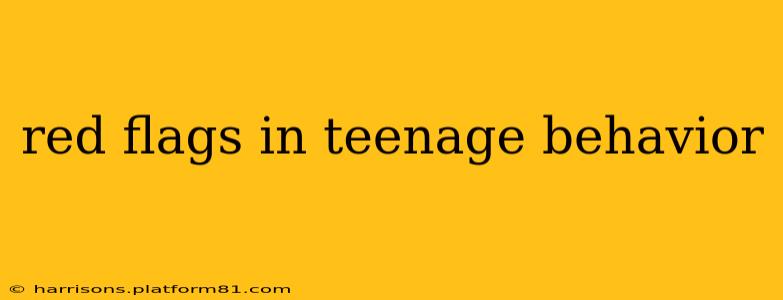Teenage years are a period of significant physical, emotional, and social change. While some experimentation and rebellion are normal parts of adolescence, certain behaviors can signal underlying issues requiring attention. Recognizing these red flags early is crucial for providing timely support and intervention. This guide explores various warning signs, addressing common parental concerns and offering guidance on when to seek professional help.
What are some common red flags in teenage behavior?
This question encompasses a wide range of potential issues. Common red flags can be broadly categorized into changes in mood, behavior, and relationships. These can include but are not limited to: significant changes in sleep patterns, drastic shifts in appetite, persistent sadness or irritability, withdrawal from friends and family, self-harm or suicidal ideation, risky sexual behavior, substance abuse, academic decline, and increased aggression or violence. The severity and combination of these factors will vary significantly.
What are the signs of depression in teenagers?
Teenage depression often manifests differently than adult depression. While sadness is a key symptom, teenagers may exhibit irritability, anger outbursts, social withdrawal, changes in sleep and appetite, loss of interest in activities they once enjoyed, and feelings of hopelessness or worthlessness. It’s important to note that these symptoms might not always be readily apparent, and teenagers may be reluctant to discuss their feelings. Persistent sadness, lasting longer than two weeks, combined with other symptoms, warrants professional evaluation.
How can I tell if my teenager is self-harming?
Self-harm, which includes cutting, burning, or other forms of self-inflicted injury, is a serious red flag indicating underlying emotional distress. While not always visible, potential signs include unexplained cuts, bruises, or scars, wearing long sleeves or pants even in warm weather, increased secrecy, and mood swings. If you suspect self-harm, approach your teenager with compassion and concern, avoiding judgment or accusations. It is crucial to seek professional help immediately.
What are the signs of substance abuse in teenagers?
Substance abuse can encompass a wide range of substances, including alcohol, marijuana, and other drugs. Signs may include changes in behavior, such as increased secrecy, mood swings, changes in friends, declining grades, neglecting responsibilities, and physical symptoms like bloodshot eyes or slurred speech. A sudden loss of interest in previously enjoyed activities or increased irritability can also be indicative of substance use.
Is it normal for teenagers to have mood swings?
Yes, mood swings are a normal part of adolescence due to hormonal changes and emotional development. However, extreme or persistent mood swings that significantly impact their daily life, relationships, or academics are cause for concern. Consistent irritability, anger outbursts, or periods of intense sadness that are disproportionate to the situation warrant further investigation.
My teenager is withdrawing from friends and family. Is this normal?
While some temporary withdrawal is common during adolescence, particularly during periods of intense focus on school or personal interests, prolonged social isolation is a significant red flag. It may indicate depression, anxiety, or other underlying issues. A gradual shift in social interactions or a sudden and complete withdrawal from previously close relationships requires attention. Open communication and encouragement to reconnect should be prioritized, with professional help sought if necessary.
When should I seek professional help for my teenager?
Seeking professional help is crucial if you observe any of the aforementioned red flags consistently or with increasing intensity. Don't hesitate to reach out to your family doctor, a school counselor, or a mental health professional if you have concerns about your teenager's well-being. Early intervention can significantly improve outcomes and prevent escalation of problems. Remember, seeking help is a sign of strength, not weakness.
What kind of professional help is available for teenagers?
Several professionals can assist teenagers struggling with behavioral issues. These include therapists, counselors, psychiatrists, and psychologists. Therapists and counselors often provide talk therapy, while psychiatrists can diagnose and treat mental health conditions with medication. School counselors can offer support and guidance, and may be able to connect families with community resources. The type of professional most suitable will depend on the specific needs of the teenager.
This information is for general knowledge and informational purposes only, and does not constitute medical advice. It's essential to consult with a qualified healthcare professional for diagnosis and treatment of any medical or mental health concerns.
